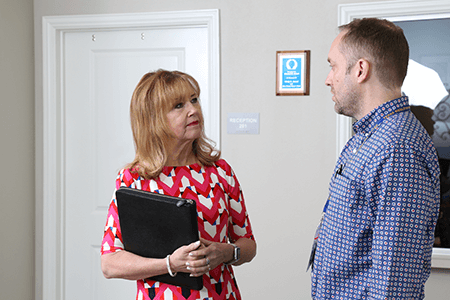Where can you work with a master's in professional counseling?

If you’re researching graduate school counseling programs, you’re probably considering counseling as a career you would excel in. Counselors play a difficult but vital role in the mental health of patients, whether they are going through a divorce or struggling with bullies.
Counseling isn’t for everyone. It requires a thick skin and solid communication skills. But for those who have what it takes, counseling is a wonderful way to make a living and touch the lives of others. So, where can those enrolled in graduate school counseling programs look for jobs following graduation?
Private Practices
Working in a private practice is a good way to have some control over your schedule and see patients regularly. Your graduate school counseling program will give you the tools you need to help patients overcome issues with their relationships, careers and in other areas of their lives.
Hospitals
There are several roles you can play as a professional counselor in a hospital setting. Patients struggling with grief, addiction and psychological issues sometimes have the need to speak with a trained professional about their situation and what their next steps should be.
Clinics
Just like a hospital, counselors in clinics have patients struggling with a variety of issues. Certain clinics focus only on counseling and therapy, while others treat mild to moderate medical issues of all types. Your graduate school counseling program will prepare you to work in both of these environments.
Mental Health Facilities
Working with patients in a long-term mental health facility is a tough job, but a rewarding one. These counselors work with some patients who will spend their life in these facilities, and others who will leave after a certain level of treatment.
Places of Worship
If you are interested in counseling from a religious perspective, you might want to consider working at a place of worship. These counselors work with community members on issues such as anxiety, substance abuse, gender issues, parenting struggles and more.
Schools
School counselors help children and teens deal with problems inside and outside of the classroom. It is common to talk to students about their family life, bullying, and yes, school troubles. If you love working with children, focusing your studies on school counseling may be perfect.
Rehab Centers
Counselors in these positions work with other health professionals to make sure patients are getting the best treatment possible, and avoid returning to their former habits.
Corporations
Many corporations employ a counselor in the human resources department of their companies, giving their employees a trustworthy person to come to when they are having issues that may be affecting their work.
Retirement Homes
While many people look forward to retirement, it can be a difficult stage in one’s life. Some people struggle to give up successful careers, and for some, their new lifestyle affects their relationships. Retirement is also a time when many difficult discussions about health and death arise.
Assisted Living Facilities
When an individual can no longer care for themselves, it takes a mental toll on them and their families. Counselors at assisted living facilities help families and patients handle the transition, as well as the grief and anxiety that comes with medical issues related to aging.
Transitional Housing Facilities
Most residents of transitional housing facilities are in the process of bettering their life. Whether they have were in prison, a rehabilitation center or have just come out of an abusive relationship, they often need the help of a counselor.
Prisons
Working in prisons and correctional facilities can be difficult, but these positions allow for a lot of opportunities to make a difference in someone’s life. Counselors help them explore the decisions that landed them in jail and plan for their future.
If one of these jobs sounds like your dream job, a graduate school counseling program might be perfect for you. Our admissions counselors are happy to discuss our master of professional counseling with you, and help you figure out your next steps.Contact them today!







